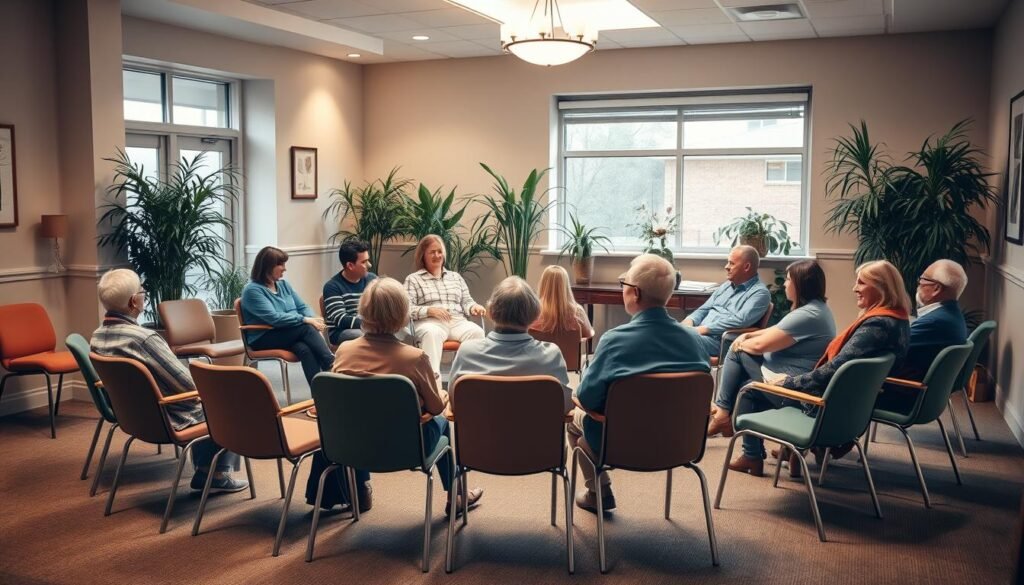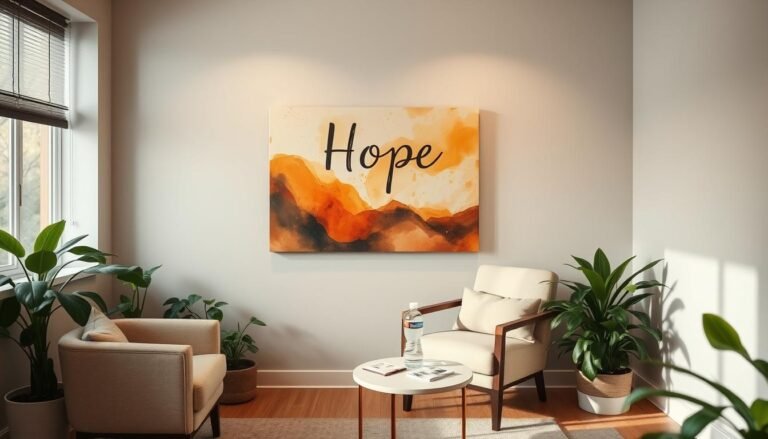Find Local Addiction Support Resources Today
Are you or a loved one struggling with addiction? You’re not alone. Millions of Americans face substance abuse challenges. But, help is out there. The question is, where do you start your recovery journey?
Finding the right addiction support can feel overwhelming. But, with the right guidance, you can find the support you need. This support can help you take back control of your life.
Key Takeaways
- Addiction support resources are available from a variety of organizations, including government agencies, treatment facilities, and local support groups.
- Confidential hotlines and referral services can connect you with the right resources for your needs.
- Explore a range of options, from inpatient treatment to outpatient programs and community-based support.
- Seek professional counseling and therapy to address the underlying issues contributing to addiction.
- Utilize online resources and digital support tools to complement your recovery journey.
Understanding Addiction Support Resources
Dealing with addiction can feel overwhelming. But, knowing about the support options can help. There are many ways to get help, from professional centers to support groups and hotlines.
Types of Available Support Services
There are many professional treatment services. These include inpatient and outpatient programs. They offer rehabilitation centers, therapy programs, and counseling services to help with addiction.
Support groups like AA and NA are also important. They offer a place to share and learn from others who have struggled with addiction.
Immediate Help Options
If you need help right away, there are options. Emergency hotlines like SAMHSA’s National Helpline are available 24/7. They offer support and help find local resources.
Professional vs. Peer Support
Both professional and peer support are key in recovery. Professional services offer evidence-based treatment and individual care. Peer groups provide a sense of community and shared understanding.
Recovery is different for everyone. It might involve both professional and peer support. The important thing is to seek help early and explore different options to find what works best for you.
National Helplines and Emergency Contacts
When someone or their loved ones face addiction, quick help is key. Luckily, many national helplines and emergency contacts are ready to assist 24/7.
The Substance Abuse and Mental Health Services Administration (SAMHSA) National Helpline offers free, confidential help. Call 1-800-662-HELP (4357) for referrals, info on addiction hotlines, and intervention services.
The National Suicide Prevention Lifeline is at 1-800-273-TALK (8255). It provides crisis counseling and connects to local services if needed. The Crisis Text Line lets you text “HOME” to 741741 for counselor support.
These helplines and emergency contacts are a vital safety net. They offer immediate help and connect people with needed resources. By calling these services, individuals can start their journey to recovery and healing.
| Helpline | Contact Information | Services Offered |
|---|---|---|
| SAMHSA National Helpline | 1-800-662-HELP (4357) | Substance abuse and mental health support, referrals to local treatment |
| National Suicide Prevention Lifeline | 1-800-273-TALK (8255) | Crisis counseling, connection to local emergency services |
| Crisis Text Line | Text “HOME” to 741741 | 24/7 crisis counseling via text message |
| Disaster Distress Helpline | 1-800-985-5990 | Emotional support and referrals for disaster-related distress |
These national hotlines and emergency contacts are a lifeline for those in need. By reaching out, they can find the help and resources to overcome addiction, mental health issues, and other crises.
Local Treatment Facilities and Rehabilitation Centers
Finding the right treatment facility is key to beating addiction. There are many options, from inpatient rehab to outpatient programs. The Substance Abuse and Mental Health Services Administration (SAMHSA) has a treatment locator. It helps find sober living facilities and addiction treatment nearby.
Inpatient Treatment Options
Inpatient rehab offers 24-hour care in a safe, structured setting. It includes therapies like counseling and medical care. It’s great for those with severe addictions or needing intense care.
Outpatient Programs
Outpatient treatment lets people keep their daily lives while getting help. They visit a facility for counseling and other recovery activities. It’s good for those with less severe addictions or after inpatient care.
Specialized Treatment Centers
There are centers for specific needs, like opioid addiction or for veterans. They offer targeted care for unique challenges. This helps address specific needs better.
| Treatment Type | Admissions in 2016 | Average Cost | Cost Savings |
|---|---|---|---|
| Inpatient | 17% | $1,583 per person | $11,487 per person |
| Outpatient | 61% | $1,583 per person | $11,487 per person |
| Detox | 22% | $1,583 per person | $11,487 per person |
Inpatient treatment may be less common but can save a lot of money. Outpatient programs are more common and flexible. They offer a good option for many people.
Support Groups and Community Programs
Recovering from addiction is tough, but support groups offer a helping hand. Programs like Alcoholics Anonymous (AA), Narcotics Anonymous (NA), and SMART Recovery connect people who get it. They work together to stay sober.
12-step programs like AA and NA use a spiritual model. They focus on personal responsibility and community support. Meetings are in-person and online, helping people find support everywhere.
SMART Recovery is a secular option. It uses self-empowerment and therapy to help people stay sober. Secular Organizations for Sobriety (SOS) and Women For Sobriety (WFS) also offer support.
Faith-based groups like Celebrate Recovery use spiritual principles. They help with depression and low self-esteem. Jewish Alcoholics, Chemically Dependent Persons And Significant Others (JACS) helps Jewish people by connecting them with their community.
Family support groups like Al-Anon, Nar-Anon, and SMART Recovery family and friends help loved ones. They offer guidance and support, creating a supportive environment for recovery.
Looking for spiritual, secular, or faith-based support? Community-based addiction support groups are here for you. They provide strength, support, and tools to overcome addiction and take back your life.

Family Support Services and Resources
When a loved one struggles with addiction, family members need support. There are many programs and resources to help families cope and support their loved one’s recovery.
Al-Anon and Alateen Programs
Al-Anon is a support group for adults affected by a loved one’s addiction. It’s a safe place to share experiences and learn coping strategies. Alateen is for teenagers dealing with a loved one’s substance abuse.
Family Counseling Options
Family counseling helps families understand addiction and support recovery. It teaches how to communicate better and set healthy boundaries.
Educational Resources for Families
There are many resources to learn about addiction and recovery. Books, articles, podcasts, and online courses offer valuable insights. They help families support their loved one’s recovery journey.
| Resource | Focus | Meeting Options |
|---|---|---|
| Al-Anon | Support for adult family members | In-person and electronic |
| Alateen | Support for teenagers affected by a loved one’s addiction | In-person and electronic |
| Families Anonymous | Support for friends, relatives, or parents of individuals struggling with addiction | Virtual meetings |
| Adult Children of Alcoholics/Dysfunctional Family Systems (ACOA) | Support for those from dysfunctional homes | Step-based support, in-person and virtual |
By using these family support services and resources, individuals can support their loved one’s recovery. They also find healing for themselves.
Online Recovery Resources and Digital Support
In today’s world, technology has changed how we fight addiction. Online tools and digital support are now key. Millions of Americans are fighting substance misuse, and tech helps them find help from home.
Telehealth platforms offer virtual doctor visits, therapy, and support groups. They use secure video calls to help people. This makes it easier to get help without leaving home.
Mobile apps for addiction recovery are also growing in popularity. They help users track their progress and manage cravings. Apps like “I Am Sober,” “Nomo,” and “WEconnect” offer different ways to support recovery.
There are also apps for self-care and wellness. “7 Cups,” “Finch,” and “Insight Timer” help with mental health. They support overall well-being in recovery.
Digital media is also helping the recovery community. Podcasts like “Recovery Elevator” and “The Addicted Mind Podcast” share valuable advice. They offer support and connection to those in need.
As tech keeps improving, more online recovery tools will be available. This means more people can find help for addiction from anywhere.
“Technology has become essential for accessible remote solutions, even during and after the COVID-19 pandemic.”

Professional Counseling and Therapy Options
Professional counseling and therapy are key in addiction recovery. They help people on their journey to sobriety. Certified professionals offer personalized paths to wellness.
Individual Therapy
Individual therapy focuses on the issues behind addiction counseling. Therapists use methods like cognitive-behavioral therapy and motivational interviewing. These help develop coping strategies and address trauma.
Group Therapy Sessions
Group therapy programs create a supportive space. People share experiences and learn from each other. It builds a sense of community and accountability.
Specialized Addiction Counseling
Certified addiction counselors have deep knowledge. They help with substance abuse challenges. They provide tailored support and relapse prevention strategies.
Professional addiction counseling and therapy programs help navigate recovery. They offer the support needed for lasting sobriety and well-being.
“Seeking professional help is a sign of strength, not weakness. It takes courage to confront addiction, but the rewards of a fulfilling, sober life are well worth the effort.”
Medication-Assisted Treatment Programs
Addiction is a complex issue that needs a multi-faceted treatment approach. Medication-Assisted Treatment (MAT) programs are highly effective for opioid and alcohol use disorders. They combine FDA-approved medications with counseling and behavioral therapies for a complete recovery plan.
The medications in MAT programs, like buprenorphine, methadone, and naltrexone, reduce cravings and withdrawal symptoms. This lets people focus on their recovery without fighting addiction all the time. Studies show this method improves treatment outcomes, keeps people in recovery programs longer, and lowers relapse and overdose risks.
MAT programs are found in specialized clinics and some primary care settings. This makes it easier for people to get help. These programs tackle the physical side of addiction, helping towards long-term recovery.
Recent data shows 5.6 million people aged 12 or older had an opioid use disorder in 2021, and 1.2 million got treatment. Almost 73% or 887,000 people got MAT for opioid misuse. Also, 381,000 individuals received MAT for their alcohol use disorder in 2021. These numbers show how important medication-assisted treatment is in fighting addiction.
MAT programs combine FDA-approved medications with counseling and behavioral therapies. This holistic approach tackles the physical, psychological, and social sides of recovery. It’s proven to be very effective in helping people stay sober and preventing relapse. This makes it a key resource for those fighting addiction.
“Research shows that a combination of medication and therapy can successfully treat substance use disorders for some medications and help sustain recovery.”
Beating addiction is tough, but Medication-Assisted Treatment programs can help. They address both the physical and psychological sides of addiction. This offers a way to a healthier, more fulfilling life.
SMART Recovery and Alternative Support Methods
For those looking beyond traditional 12-step programs, SMART Recovery is a great choice. It’s backed by the National Institute on Drug Abuse and the American Academy of Family Physicians. SMART Recovery’s 4-Point Program helps build motivation, manage urges, and live a balanced life.
Evidence-Based Programs
SMART Recovery teaches skills to handle cravings and urges over time. It uses cognitive-behavioral techniques that keep up with new science. The SMART Recovery Handbook offers detailed guidance and exercises for staying sober and gaining self-control.
Holistic Treatment Approaches
Other programs like Secular Organizations for Sobriety (SOS) and Women for Sobriety also offer support. These holistic methods might include mindfulness, nutrition, and exercise for better well-being. They focus on self-empowerment and science, giving people more choices for recovery.






